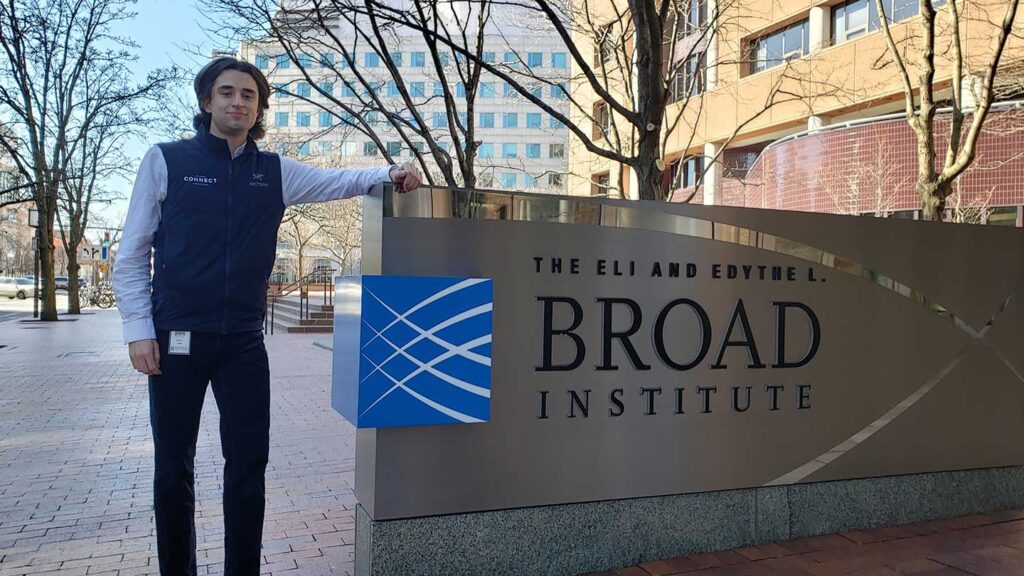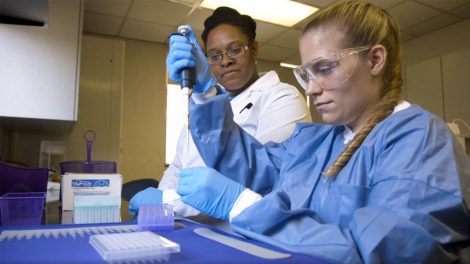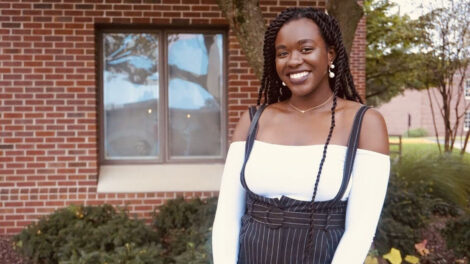Biology grad discusses how his experiences at Lafayette helped pave the way to his current role as a COVID-19 researcher
Andrew Hudak ’19 is a research associate within the Xavier Lab, headed by Ramnik Xavier, M.D., at the Broad Institute of MIT and Harvard in Cambridge, Mass. He is currently working with Johannes F. Scheid, M.D., Ph.D., a research fellow in gastroenterology, on various antibody-based projects centered on COVID-19 and inflammatory bowel disease. Through his work, Hudak aims to better understand the human immune system and how it is involved in, and responds to, disease. His research on COVID-19, in particular, analyzes the B-cell response against SARS-CoV-2 variants and SARS-CoV to uncover cross-neutralizing antibody targets. Hudak holds a Bachelor of Science degree in biology from Lafayette College.

Andrew Hudak ’19 is a research associate within the Xavier Lab, headed by Ramnik Xavier, M.D., at the Broad Institute of MIT and Harvard in Cambridge, Mass.
What do you love about the work you do? What does it mean to you to be able to conduct research on a virus that has had such a momentous impact on the world, and to potentially help save lives?
I cannot claim to be a hero of the pandemic; those were, and still are, the front-line medical workers, doctors, and nurses who risked their lives every day to treat those who are suffering from COVID-19. At the Broad, our research looks to ensure that something on this scale never happens again. It is an incredible honor to play a role in an event that will define the 21st century. To be able to conduct research on a topic with such large-scale implications is not something I thought I would be doing just one year out of college.
If you had asked me this question pre-pandemic, I would tell you about the Broad Institute and all of the innovative research that goes on here. I would tell you how, at any point throughout the day, you can walk into one of the conference rooms or auditoriums and hear about these projects. Unfortunately, this is on hold for the time being, but I still love the Broad—this world-class, revolutionary community that is so very committed to science.
What sparked your interest in science and research? Was this something you always wanted to do?
I have always had an affinity for math and science. I was good at them in grade school, and their content has always been incredibly interesting to me.
This was why I first decided to pursue an education in biology. Biology contains many topics that interest me—including, but not limited to, biochemistry, cancer biology, immunology, and genetics. I never had a moment in which I knew research was what I wanted to do for the rest of my life, but I have had various moments that have led me to different life decisions.
How did your experiences at Lafayette help lay the foundation for your career and build the necessary skills that you use in your work today?
Lafayette helped me grow into a very critical and curious person. It was within my four years at Lafayette that I grew up, made lifelong friends, and learned about things that didn’t exist when I started school in 2015. The liberal arts education is a valuable one, and Lafayette provides an excellent example of this curriculum. Lafayette also helped me become a resilient problem-solver—someone who sees failure not as an obstacle, but as a necessity on the road to success. However, I think the friends I made at Lafayette taught me the most about life and made me the person I am today.
Were there any particular professors, courses, or experiences that were particularly influential to you during your time at Lafayette and that continue to impact your work today?
I owe a lot, if not all, of my scientific success to Khadijah Mitchell, Ph.D. Without her, I would never have had this opportunity to work at the Broad. Up until my junior year at Lafayette, I was unsure of what I wanted to do with my interest in science. It was Dr. Mitchell’s course on precision medicine that introduced me to the science I now work on.
Dr. Mitchell—one of the most extraordinary, dedicated scientists I have met—showed me that we are at the very early stages of what is known as the Bio Revolution. The next 25 years of this revolution will rival the period of innovation that gave us the internet. Much like how the tech revolution gave us the internet and in turn Instagram, Twitter, Snapchat, etc., the Bio Revolution will allow us to edit our genetic code, solve diseases that seem unsolvable now, and hopefully save us from the impending climate disaster.
My 2018 summer research fellowship with Dr. Mitchell was also a particularly rewarding experience. Dr. Mitchell always believed in me as a scientist, and also trusted me to uphold the standards of science, refusing to accept anything other than my very best. Dr. Mitchell operates at an extremely high level, and as an early member of her burgeoning lab, I was expected to operate at this same level. The work was challenging at times and helped me develop a better sense of grit and perseverance. It also gave me a chance to prove myself as a scientist. The research I conducted with Dr. Mitchell gave me the foundation to take on a much larger thesis project in the fall of my senior year, and put me on the trajectory that I continue to follow today at the Broad.
While at Lafayette, I applied for the opportunity to join the Broad Biomedical Post Baccalaureate Scholars (BBPS) Program, in which a successful candidate is accepted into the program and ‘matched’ with various labs that show interest in them. Among the labs I was matched with, the Xavier Lab stood out to me, not only for the competitive, innovative research environment, but because Dr. Scheid, the scientist I would be working with, shared so many of the incredible qualities that I saw in Dr. Mitchell. I joined the Xavier Lab, and started to work with Dr. Scheid on a project focused on better understanding the role of the immune system in inflammatory bowel disease (IBD), which includes Crohn’s disease and ulcerative colitis.
What are your goals for the future?
I plan to attend graduate school in the fall of next year and obtain a Ph.D., most likely in a biological and biomedical sciences program—specifically immunology and how it pertains to infectious disease. I think we are at a nascent stage of the Bio Revolution, and the next 20 years will bring about immense change. The pandemic will only accelerate this change. I would either like to conduct research, most likely on infectious disease, or move toward the side of industry or investment. It is hard to tell which is more impactful; I have yet to decide.
What kind of advice can you offer to current biology students about how to apply what they’re learning to their future careers?
In science, I think it is very important to find what interests you. Once you find that, you just let your curiosity run free, and the work stops feeling onerous or difficult. In science, it is also hard to really accomplish anything substantial in one day. I think being able to see the big picture is incredibly important, because the day-to-day lab work can get a bit monotonous. Long hours in the lab will start to seem pointless if you cannot see the end goal.
If I could talk to my first-year self, I would tell him to be patient and think about what you really want to do with your life. I would also tell him to spend more time with friends and stop worrying so much about school. In science, your curiosity and research experience matter much more than your grade in organic chemistry. Do not spend too much time thinking about what is right or wrong, or a good or bad choice. Focus on the big picture and give yourself more opportunities tomorrow than you have today.
Also, I am a campus ambassador at the Broad, and I would be happy to speak with any STEM students interested in a post-baccalaureate research opportunity. Although Lafayette is not currently a target school, I hope to establish a more formal relationship between Lafayette and the Broad Institute in years to come.


